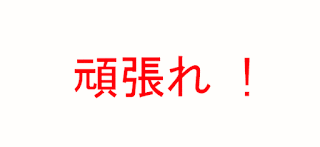Informal Imperative Form Verb
JLPT Level: -Meaning: informal command
Formula:
change the verb into meireikei
For u-ending verbs change the u-ending to e-ending. Example:
買う > 買えFor ru-ending verbs: change ru-ending to ro. Example:
kau > kae
死ぬ > 死ね
shinu > shine
書く > 書け
kaku > kake
話す > 話せ
hanasu > hanase
待つ > 待て
matsu > mate
飲む飲め
nomu > nome
食べる > 食べろAnd for irregular verbs, suru and kuru, suru become shiro and kuru become koi and kureru become kure. Example:
taberu > tabero
見る > 見ろ
miru > miro
辞める > 辞めろ
yameru > yamero
する > しろNote: This form sounds very blunt and harsh: avoid using it for commands and request and It is used in quotation, public sign, Anime, etc
suru > shiro
来る > 来い
kuru > koi
くれる > くれ
kureru > kure
Sentence Example:
「起きろ」と父が言いました
"okiro" to chichi ga iimashita
My daddy said "get up!"
お金をくれ!
O-kane o kure!
Give me your money!
こっちへ来い!
Kocchi e koi!
Come here!
死ね!
Shine!
Die!
頑張れ!
Ganbare!
Go for it! / Keep going!
やめろ!
Yamero!
Stop it!
Maybe you may also like to read: Japanese Grammar Lesson: ~nasai (~なさい)
Ok, stop it, stop the lesson^^, and let's learn other Japanese lessons again tomorrow^^, mata aou ne.


Hello, it is quite confusing....it can be written to elaborate with Japanese Example
ReplyDelete